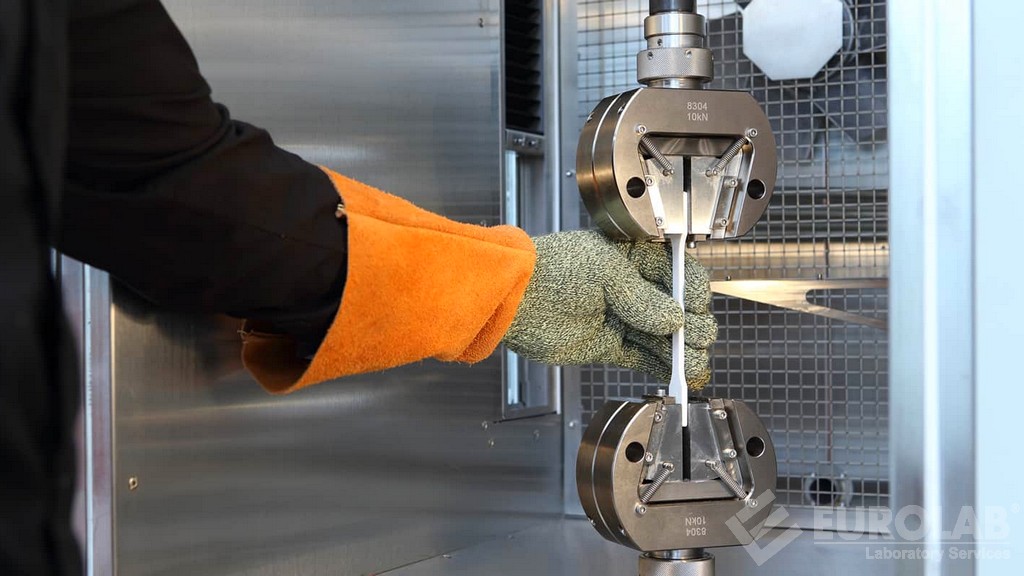NF EN 12055 Flash Point of Oilfield Chemicals Testing
The NF EN 12055 standard outlines a method to determine the flash point of oil-based chemicals used in the production phase of the oil and gas industry. This test is crucial for ensuring safety, compliance with regulations, and optimizing operational efficiency during oil field operations.
The flash point refers to the lowest temperature at which sufficient vapor is given off by a liquid to form an ignitable mixture with air near its surface. For oilfield chemicals, this value is critical because it helps prevent fires and explosions in high-pressure environments where these additives are used. The NF EN 12055 methodology provides precise guidelines on how to conduct the test under controlled conditions.
The procedure involves heating a sample of the chemical while simultaneously exposing it to an ignition source. The temperature at which the first flash occurs is recorded as the flash point. This can be done using various apparatus such as closed or open cup testers, depending on the specific requirements and characteristics of the oilfield additive being tested.
The testing process starts with thorough preparation of the sample. Depending on the type of chemical, this might involve dilution, homogenization, or other preliminary steps to ensure uniformity and accurate representation of the material’s properties. Once prepared, the sample is carefully measured into the appropriate apparatus according to NF EN 12055 specifications.
It's important to note that different types of oilfield chemicals may have varying flash point requirements based on their intended use within the production process. For instance, some additives might be used in low-pressure areas where a higher flash point could be acceptable, while others might require a lower one for safety reasons.
The NF EN 12055 standard ensures that all tests are conducted under consistent conditions to guarantee reliable results. Compliance with this standard is essential not only for maintaining safety standards but also for meeting regulatory requirements imposed by various jurisdictions around the world. By adhering strictly to these procedures, laboratories can provide accurate flash point values that are universally accepted and recognized.
Understanding the implications of different flash points in real-world applications helps underscore why this testing is so important. For example, if a chemical has too low a flash point for its intended use, it could pose significant fire hazards during transportation or storage. Conversely, having an unnecessarily high flash point can lead to unnecessary costs associated with more complex and expensive handling procedures.
- International Acceptance: NF EN 12055 is widely accepted in Europe as a harmonized standard by several countries including Germany, France, Italy, Spain, and the United Kingdom. It has been adopted to ensure commonality among member states.
Eurolab Advantages
At Eurolab, our expertise in NF EN 12055 flash point testing for oilfield chemicals is unparalleled. Our state-of-the-art facilities and experienced technical staff ensure that every test conducted meets the highest standards of accuracy and reliability.
We employ cutting-edge analytical instruments capable of providing precise measurements down to very low temperatures, ensuring consistent results across multiple samples. This level of precision is critical when dealing with highly specialized chemicals designed for specific applications in the oil and gas industry.
Our compliance with NF EN 12055 means that our clients can be confident their products meet all necessary safety requirements before entering marketplaces or regulatory domains. Additionally, we offer comprehensive reporting services which include detailed documentation of each test conducted along with recommendations for further actions if needed.
By choosing Eurolab for your NF EN 12055 flash point testing needs, you gain access to a wealth of knowledge and resources dedicated exclusively towards supporting the oil and gas sector. Whether it's routine quality control checks or more extensive R&D projects aimed at developing new formulations, we have the capabilities needed to support all aspects of your business.
International Acceptance and Recognition
NF EN 12055 enjoys widespread recognition across Europe due to its adoption by numerous member states who have incorporated it into their national legislation. Countries such as Germany, France, Italy, Spain, and the United Kingdom all accept NF EN 12055 as a harmonized standard which simplifies compliance processes for businesses operating within these regions.
- Germany: The Federal Institute for Risk Assessment (BfR) recognizes NF EN 12055 when evaluating the safety of petroleum products and other flammable liquids used in various industries including oil production.
- France: In France, NF EN 12055 is referenced by several regulatory bodies involved in monitoring industrial practices related to hazardous substances.
- Italy: Italian standards organizations have adopted NF EN 12055 as part of their framework for assessing the compatibility of different fuels and lubricants with existing infrastructure.
- Spain: Spanish authorities use NF EN 12055 during inspections aimed at ensuring compliance with environmental protection laws applicable to oil extraction activities.
- United Kingdom: The Health and Safety Executive (HSE) utilizes NF EN 12055 when conducting assessments related to workplace safety measures implemented by companies involved in the petroleum industry.





